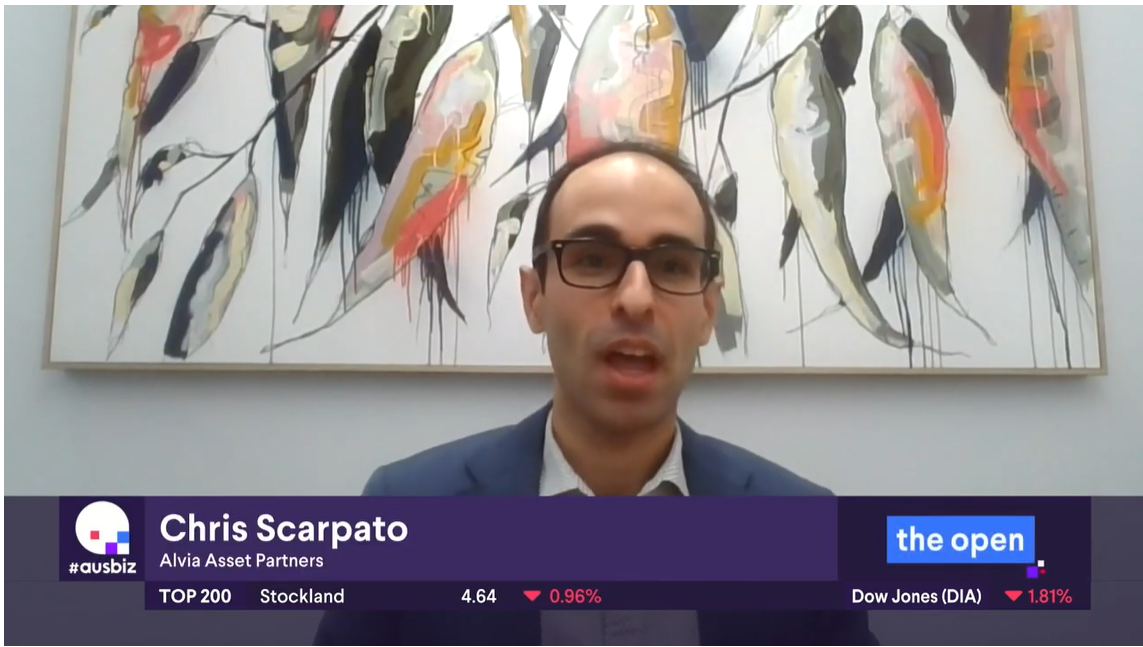
Chris Scarpato talks to ausbiz and outlines the risks of home bias in Aussie portfolios, debunks the belief that ETFs are risk-free and can be relied on as long-term wealth creation vehicles and emphasises the importance of a holistic asset allocation approach.
In this recent chat with Annette Beacher and David Scutty of ausbiz, Chris Scarpato shares a few common investment pitfalls, including how having a home bias in an Australian portfolio could mean you miss out on gains from offshore exposure. He also explains why ETFs are not risk-free and why it’s worth considering a more holistic asset allocation approach and not jumping on the latest bandwagon.
(He also warns you to be aware of company and fund approaches to ESG and risks of ‘greenwashing’.)
Chris Scarpato
So I think in our view, here at Alvia is very much capital reservation is considered first and foremost, and that involves looking beyond Aussie equities as an investment opportunity, but just really making sure that you’re not taking any more risk than you’re willing to bear based on your risk tolerance and your long-term return objectives.
Annette Beacher
So, Chris, are you finding that we have this discussion about ETFs all the time? Is there a misconception that ETFs equals ‘riskless‘ because we know that’s not the case.
Chris Scarpato
Yes Annette, I think you’re spot on there. And I think with the massive flow into passive ETFs, people are sort of using them as these long term wealth creation vehicles. But I think in our view, there’s especially with sort of market value weighted ETFs. We feel they’re a bit of a momentum strategy. So when you’re entering, say, an ASX 200 ETF today, you’re getting a large exposure to the biggest companies on the ASX. So those companies that are outperforming the market, obviously Afterpay is becoming square scrip. But you’re getting an overweight exposure to companies that are arguably overvalued and an underweight exposure to undervalued businesses, for example.
Chris Scarpato
So you’re basically taking an opposite bet to a sort of fundamental valuation investment approach.
David Scutty
So there are some people looking for passive investment where are you finding the opportunities at the moment?
Chris Scarpato
Yeah. It’s a good question. I think in light of your little snippet on Rio and Fortescue, we’re finding that there’s a lot of, and I’ve spoken about it previously on the show, assets out there that are sort of appearing a bit stranded because a lot of fund managers and institutional investors can’t invest in assets that have any ‘sniff’ of coal or fossil fuel exposure. Even gas. And for us, this means overlooking companies the likes of Aurizon and even APA Group – APA was subject to a takeover surrounding three years ago to $11 a share. It’s now trading at $8 just below $9 a share and paying a 6% yield, inflation link cash flows. These really good quality business that are being overlooked at the moment.
Annette Beacher
And in the wake of COP26, and, of course, our Prime Minister is copping a lot of Flack for not doing enough. It seems like private companies are stepping up. But should shareholders be really aware of what some of these private companies are doing in terms of risking ‘greenwashing’ going forward?
Chris Scarpato
Yes, I think it’s a really good point Annette. And like you were saying, the $2 million spend for the like of Rio, it’s pretty insignificant. We’re all for this push to a greener future but I think there’s two important considerations. Firstly, you need to make sure it’s a sustainable move. And obviously when you’re moving a big chunk of, say, energy consumption from fossil fuels base load to green energy, it’s about making sure there’s enough renewable energies and reliability of that energy to provide electricity. But I think shareholders need to hold their boards and management to account to make sure that it is benefiting society and the overall environmental push, but there’s also an important consideration of economics there as well, because ultimately, these are private businesses that you have to look after a number of different stakeholders, including the capital markets, being your shareholders and your bondholders as well. So just making sure that they’re not just sort of headline grabbing, that green washing PR focus, and instead they actually are tangible, and they’re there for the long term. They’re not just sort of pushing this ESG story.
Annette Beacher
And I guess more generically, we’ve seen everyone pile into hydrogen, pile into lithium. There’s that risk of a sort of pop, shall we say, but they’re still going to be a ten and 20 year future.
Chris Scarpato
Yes, that’s right. From some of the research we’ve done, definitely hydrogen does have its place. And using APA as an example, they’re actually starting to transfer some of their pipelines to be able to carry hydrogen rather than LNG. But yeah, to your point, these are long term investments. And there’s still a lot of science and research to sort of prove up some of these technologies. So we’re all for these types of investments, but whether they’re investable at the moment based on our clients’ risk appetite and tolerances is a different matter.
Chris Scarpato
But it’s good seeing companies invest in these areas. It’s just making sure they’re not gimmicks and they actually are technologies that we believe can sort of move economies to a greener future.
Annette Beacher
It’s certainly something we’re all keeping an eye on. Look forward to further conversations. Chris Scarpato from Alvia Asset Partners, thanks for joining us.
Chris Scarpato
Thanks Annette and Scutty. Thanks for having me on.